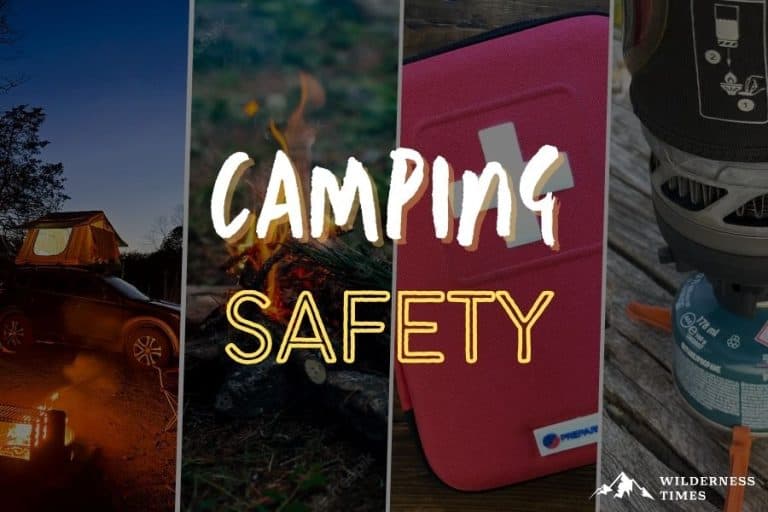Camping, hiking and outdoor activities are loads of fun – but sometimes, accidents happen.
And, when you’re out in nature, far away from civilization, you need to be prepared.
I’ll be honest – I can’t cover every single scenario that could possibly go wrong on your trip. But, I can cover the most common camping safety issues you might face, to help you stay safe in the wilderness.
Today, I’ll talk about everything from bad weather, to first aid, to fire safety and even poisonous plants.
So, without further ado, let’s dive in!
Stay Up To Date With The Weather Forecast
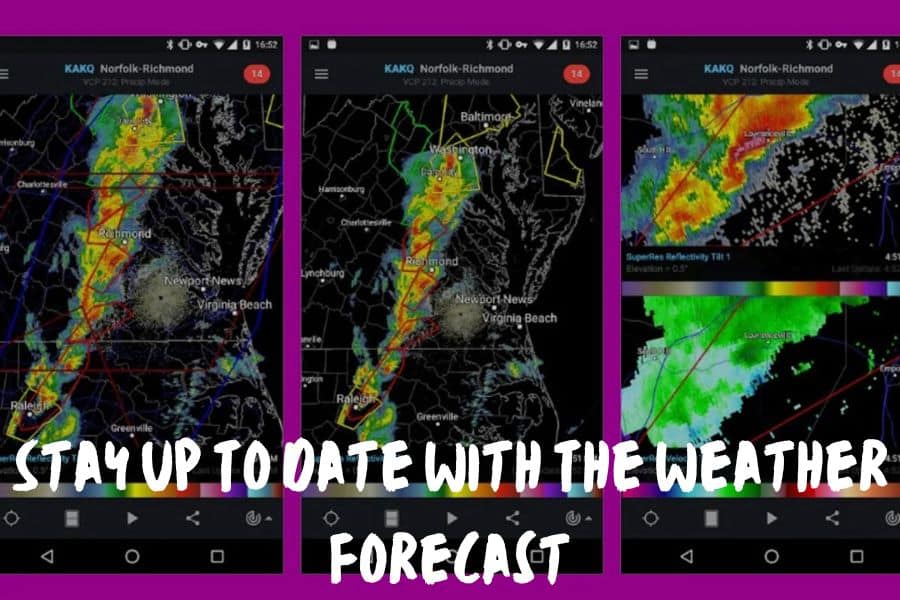
You look at the weather forecast, and you see that the last days of the month are going to be nice and warm.
Perfect for planning your next camping trip.
But, don’t just write it down in your calendar and forget about it until it’s time to go.
The reason I say this is because the weather can change. So, make sure to check the forecast regularly in the days leading up to your camping trip.
If the weather changes, you might need to pack extra camping gear, or even reschedule your trip.
You should check the weather every day during your trip, too. One day might be warm and dry, but that can change in a few hours, and keeping track of the forecast will help you prepare on time.
Don’t forget that nights in nature can be way cooler than nights in the city. While you might be wearing t-shirts and shorts during the day, there’s a possibility you might need to wear thick socks and a jacket to stay warm at night. So keep that in mind when you’re packing your clothes.
Food Safety
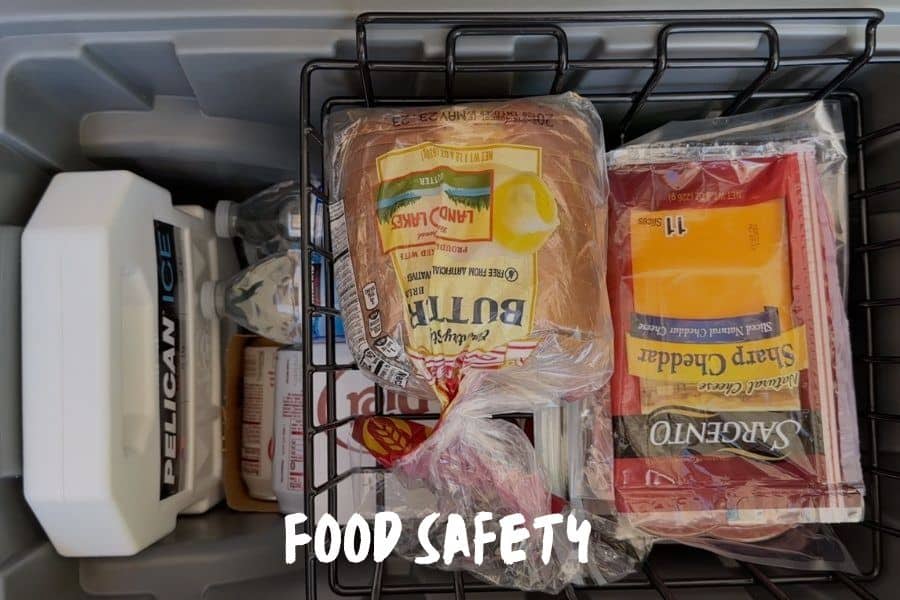
Storing your food the right way is important, especially during the warmer months.
If you plan on bringing steaks and burgers on your camping trip, you need to store them in a cooler unless you want them to go bad.
When preparing food, make sure to wash all your fruit and vegetables in clean water.
It’s also important to always prepare your meals on a previously washed surface. We all do this at home anyway, and it’s even more important to do it in the wilderness, where we’re surrounded by different pathogens.
What’s more, you need to be careful that your food doesn’t land you any unwanted dinner guests. The scent of food can attract local wildlife, so you should always make sure to remove leftover food from tables, and store it in the car.
If you’re camping in bear country, a bear-proof container is a must.
This brings me to my next point.
Stay Alert For Wildlife
Although fascinating, wildlife can be really dangerous.
That’s why you should always avoid feeding forest animals. If you get them used to coming to the campsite and eating, they might become aggressive towards humans in the future in search of food.
What’s more, human food might be too harsh on their stomach, since these animals aren’t used to eating food similar to ours.
See: Does Bear Spray Work on Mountain Lions?
Bears
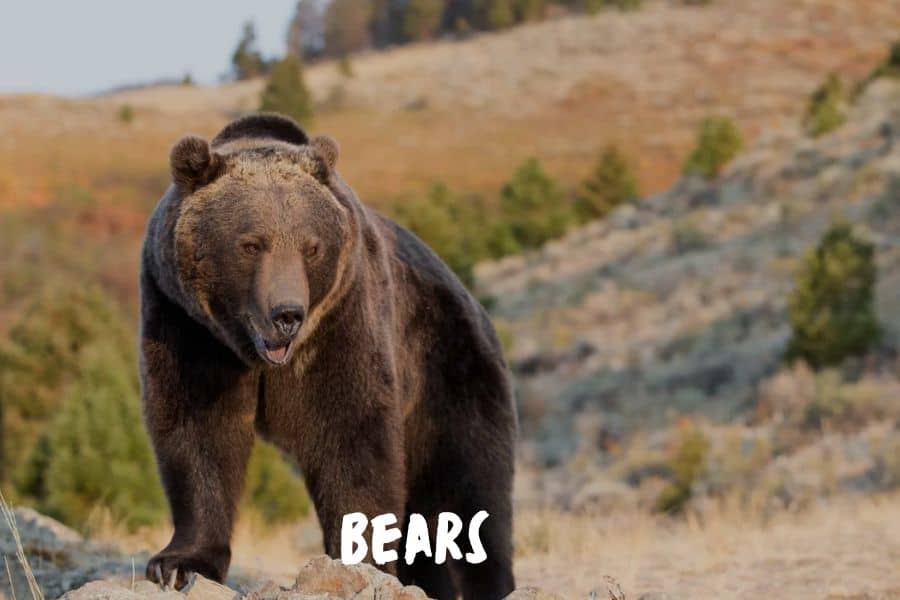
Take extra caution when camping in bear country.
I already mentioned that a bear-proof food container is essential, as it blocks the scent and locking lids prevent the bear from opening them.
Another necessity is a bear spray – a simple tool that keeps bears away and could save your life in case of an encounter.
Read: How Far Can a Bear Smell? (And How To Avoid Them)
Snakes

During summer, snakes are also an issue.
But these creatures are actually shy and won’t attack you unless they feel endangered.
To avoid any contact with snakes, stay on the road. That way, you can clearly see if there’s anything in your way.
You can scare them away by simply talking loudly. Even if that means talking to yourself. In fact, any snakes around will surely run away from you, thinking you’re a fruitcake.
Insects
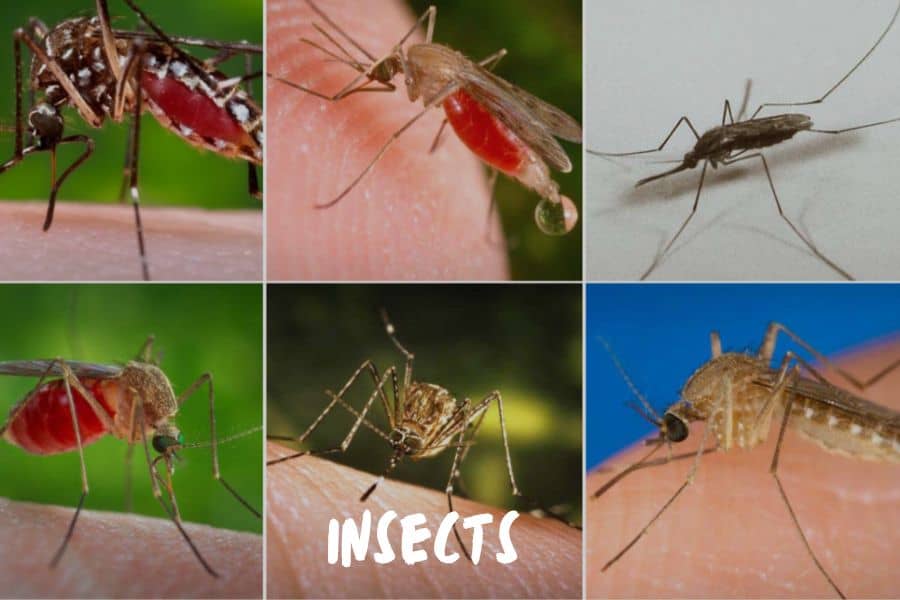
We can’t forget about insect bites either.
Especially the most annoying of them all – mosquitoes. Nothing can destroy a camping trip like getting covered in itchy bites from head to toe. That’s why I never go camping without insect repellent and coils.
Finally, we have insects whose bites we can’t prevent but can quickly deal with. Yes, I’m talking about ticks. And while our pets wear those collars that repel ticks from a mile away, most sprays and towelettes for human use don’t work nearly as well.
For that reason, make sure to check your skin for ticks on a daily basis. And look carefully and thoroughly, because the sooner you remove a tick, the lower your chances are of catching any nasty disease they might transmit.
The risk of catching Lyme disease is minimal as long as you find and remove the tick within 24 hours. Still, be on the lookout for symptoms like a rash or fever over the next few weeks, just in case.
Protect Your Skin From The Sun
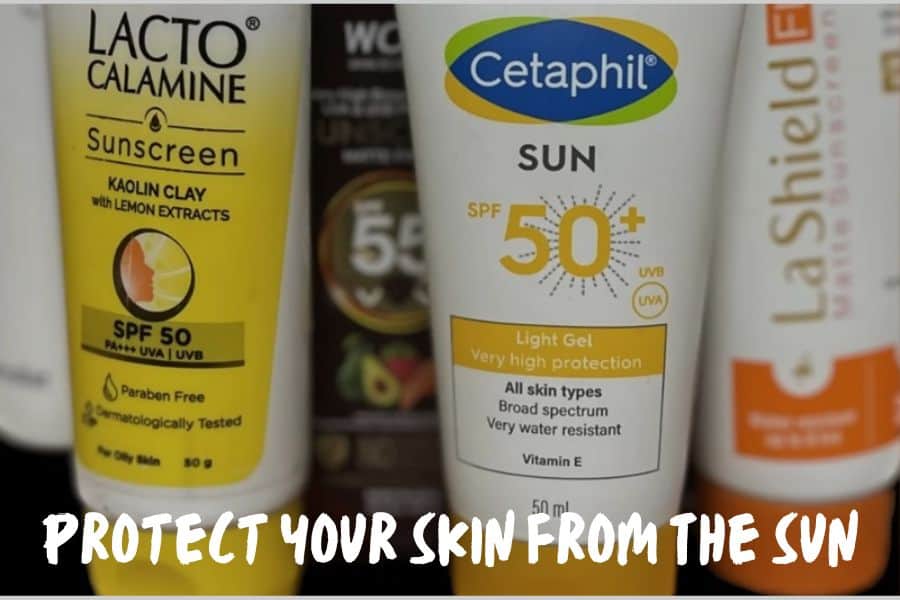
In my early 20s, I was against using sunscreen.
I mean, who doesn’t love having a nice sunkissed tan, right?
But over the years, I’ve realized that the sun damages our skin in different ways, from causing dryness and blemishes, to skin cancer.
Nowadays, I wear sunscreen every time I’m outdoors, whether it’s a day at the beach or a camping trip. And you should too.
Apply sunscreen 30 minutes before stepping out in the sun, and reapply it every 2 hours throughout the day.
During the day when the sun is at its highest point, you should also wear a hat that covers as much of your face as possible.
And don’t forget the rest of your body. Wear something that covers your skin from the sun, and stay in the shade whenever you can.
Bring A First Aid Kit
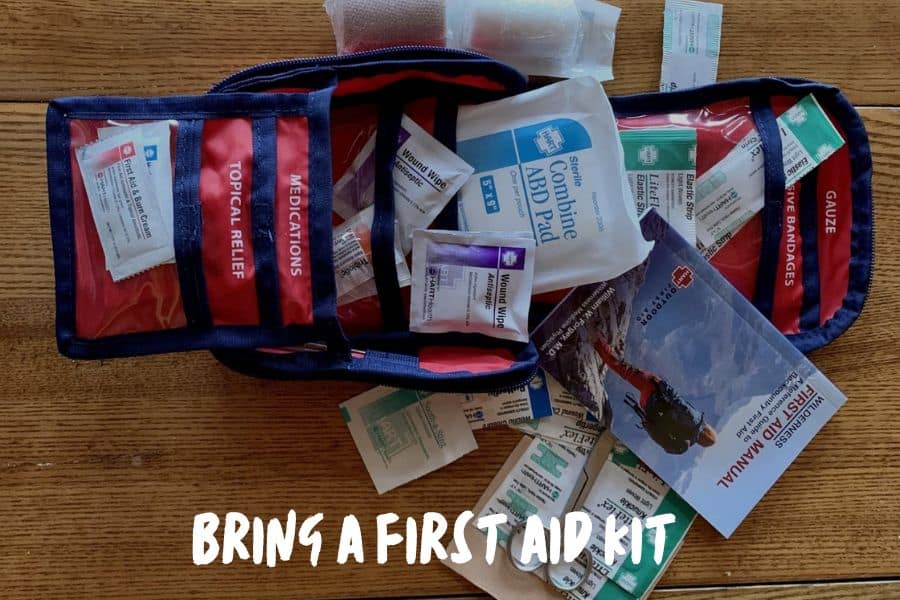
You won’t always set up camp a short ride away from a hospital. That’s why you should know how to perform at least basic first aid assistance. If you don’t, you can take a course at your local Red Cross.
Plus, of course, you should have a kit with the most important medical supplies.
Your kit should include:
- Different types of bandages
- Gauze pads
- Antibacterial ointment
- Disinfectant wipes
- Pain and anti-inflammatory medicine
- Hydrocortisone cream
- Tweezers, scissors, safety pins, and knife
- Sunburn relief spray
- Snakebite kit
- Anti-diarrhea medicine
- Antihistamine for allergic reactions
- Aspirin or ibuprofen
- Eye drops
- Moleskin
- Hand sanitizer
The more supplies you have at your disposal, the better. But, these kits can be bulky and heavy.
If that’s the case, at least pack the essentials whenever you’re going for a walk away from your campsite. Tweezers and bandages should always be close at hand.
Campfire Safety
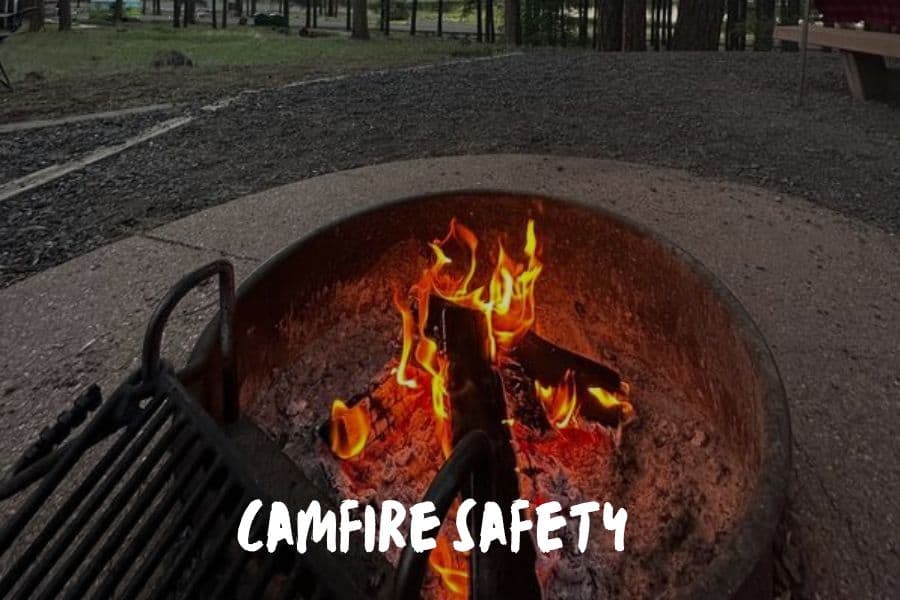
My favorite thing about camping is sitting around a campfire.
Add some marshmallows on sticks and late-night tête-à-tête with friends, and that’s my idea of a night to remember.
But although enjoyable, campfires can also be dangerous. It only takes a moment of recklessness to start a wildfire.
To avoid that, the first thing you need to do is check your local fire restrictions. If there ARE restrictions, then you’ll want to utilize one of several alternatives to a campfire.
If there are no restrictions, you should always set your campfire up at least 15 feet away from your tent, but also any bushes and trees.
This goes without saying – but never leave a fire unattended. If you plan on leaving the campsite, even for just 10 minutes, put it out by pouring a large amount of water over the fire pit.
This brings me to my next point.
Always, always, always have a bucket of water around, just for putting out the fire. Wind can appear out of nowhere, especially in the mountains, and you need to have a quick way to extinguish the fire if that happens.
And, finally, never start a fire in extremely windy conditions. Even the lightest breeze could blow sparks to bushes or trees nearby, potentially causing a wildfire.
Stay Hydrated

Drinking plenty of water is important, especially when you’re active.
You should never wait until you’re thirsty, because that means you’re already dehydrated. Instead, remember to take a sip every once in a while.
At the very least, your daily intake should be a gallon of water. If you’re hiking, swimming or playing a ball game, you’ll need even more – up to a glass of water every 20 minutes.
So, you need to make sure to bring plenty of bottled water on your camping trip.
This means that, if you’re staying more than a few days, water will take up a lot of space in your trunk. So, if there’s a water source nearby, make use of it.
But don’t just take a sip straight from a river. All kinds of nasties that can cause stomach problems live there.
You need to purify it first. For this, you can get straw filters or purification tablets. Or, if neither one is available, decontaminate it using the classic method of boiling.
Also Read: Hiking Safety Tips (How to Stay Safe on the Trail)
Beware Of Poisonous Plant Species
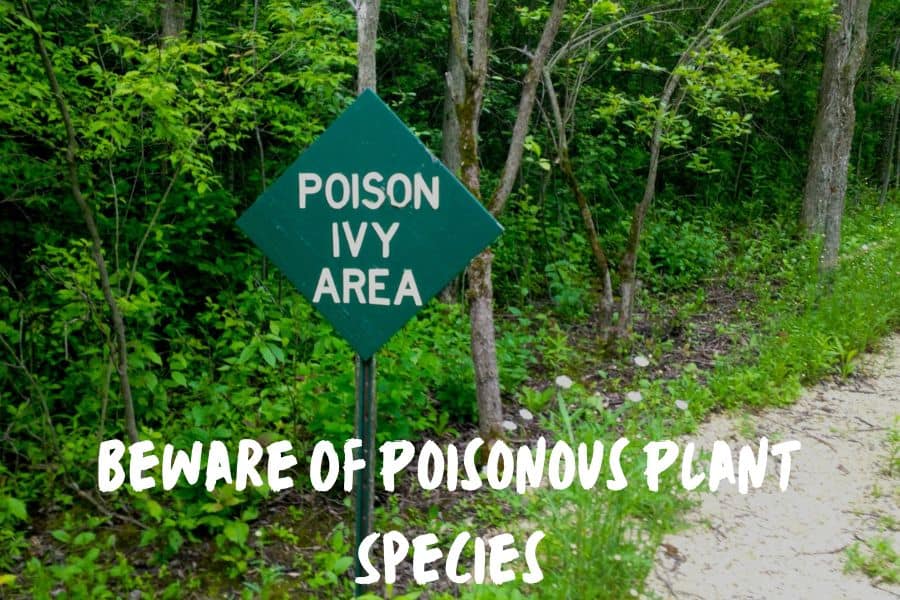
When you’re in nature, you need to be careful of poisonous plants.
Poison ivy, poison oak, and poison sumac are the most obvious threat – but they aren’t the only poisonous plants you should be worried about.
Aside from these, some of the most beautiful plants are also quite toxic.
Take rhododendron or oleander for example. A bouquet of these gorgeous flowers can cause all kinds of health issues from gastrointestinal distress to even convulsions or coma in extreme cases.
For that reason, avoid touching unknown plants.
There are plenty of websites and apps with plant databases that you can research before you go ham and pick a flower.
Some plants aren’t poisonous but can cause skin reactions.
Take a nettle for example. If you ever accidentally walked through some nettles in short shorts, you know how much they can sting.
Plus, you could also be allergic to a certain plant. That’s why you should keep a hydrocortisone cream in your first aid kit, as it relieves itching.
To Sum Things Up
As you can see, there are a lot of things to keep in mind when it comes to camping safety. From weather and wildfires to food storage and wildlife, you always need to stay alert.
But, that doesn’t mean you can’t have fun.
After all, that’s the whole point of the trip, isn’t it?
Next up: Camping Etiquette: Understanding the Rules of Camping for a Positive Outdoor Experience


